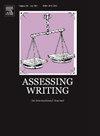哪种性别提供更具体的同伴反馈?性别和评估培训对同伴反馈特异性和个人因素的影响
IF 5.5
1区 文学
Q1 EDUCATION & EDUCATIONAL RESEARCH
引用次数: 0
摘要
本研究调查了评估者性别(男性与女性)、虚构的评估者性别(男性与女性)和评估培训(有与没有)对同伴反馈特异性(即定位和焦点)和个人因素(即对自我作为评估者的信任和不适)的影响。这项研究涉及240名心理学本科生(n男=120,n女=120),其中一半接受评估训练,另一半接受任务指导。参与者根据培训条件和自我报告的性别分为8个小组,由Eduflow中虚构的男性或女性同行评议者对三个写作样本(差、一般、优秀)提供同行反馈。共分析了3017个同伴反馈部分,揭示了在评估虚构的男性或女性评估者时,受过培训或未受过培训的男性和女性评估者在大多数同伴反馈特异性类别中具有可比性。尽管如此,我们也发现女性评估者在同伴反馈特异性的某些类别中表现出色,而男性评估者在其他类别中也表现出能力。结果还显示,接受评估培训的评估员在所有写作样本中提供了本地化的同行反馈。最后,性别和培训不影响参与者对自己能力的信任和提供同伴反馈时的(不)舒适感。本文章由计算机程序翻译,如有差异,请以英文原文为准。
Which gender provides more specific peer feedback? Gender and assessment training’s effects on peer feedback specificity and intrapersonal factors
This study investigated the effects of assessor gender (male vs. female), fictitious assessee gender (male vs. female), and assessment training (with vs. without) on peer feedback specificity (i.e. localisation and focus) and intrapersonal factors (i.e. trust in the self as an assessor and discomfort). This study involved 240 undergraduate psychology students (nMen=120, nWomen=120), with half receiving assessment training and the other half receiving the task instructions. Participants were divided into eight subgroups based on training condition and their self-reported gender to provide peer feedback to three writing samples (poor, average, excellent quality) by fictitious male or female peer assessees in Eduflow. A total of 3017 peer feedback segments were analysed, revealing that trained or untrained male and female assessors were comparable in most peer feedback specificity categories when assessing fictitious male or female assessees. Nonetheless, we also found that female assessors excelled in certain categories of peer feedback specificity, while male assessors also demonstrated competencies in other categories. Results also showed that assessors who received assessment training provided localised peer feedback in all the writing samples. Finally, gender and training did not affect participants’ trust in their abilities and (dis)comfort when providing peer feedback.
求助全文
通过发布文献求助,成功后即可免费获取论文全文。
去求助
来源期刊

Assessing Writing
Multiple-
CiteScore
6.00
自引率
17.90%
发文量
67
期刊介绍:
Assessing Writing is a refereed international journal providing a forum for ideas, research and practice on the assessment of written language. Assessing Writing publishes articles, book reviews, conference reports, and academic exchanges concerning writing assessments of all kinds, including traditional (direct and standardised forms of) testing of writing, alternative performance assessments (such as portfolios), workplace sampling and classroom assessment. The journal focuses on all stages of the writing assessment process, including needs evaluation, assessment creation, implementation, and validation, and test development.
 求助内容:
求助内容: 应助结果提醒方式:
应助结果提醒方式:


